The Interim Committee on Electric Services in an Annexed Area (perhaps better labeled the Electric War Committee) posted seven documents from its July 25 hearing. Among them are the dueling presentations of the municipal electric utilities, which are fighting to keep their statutory right to unilaterally annex territory and seize electric customers, and the rural electric cooperatives, which are fighting to change the law and protect themselves from such forced losses of territory and customers.
The municipal electric utilities, somewhat deceptively branding themselves as the “Coalition to Preserve Consumer Choice,” designed their portray themselves as the Davidly defenders of citizen rights against a Goliath created by government. Consider their fourth slide:
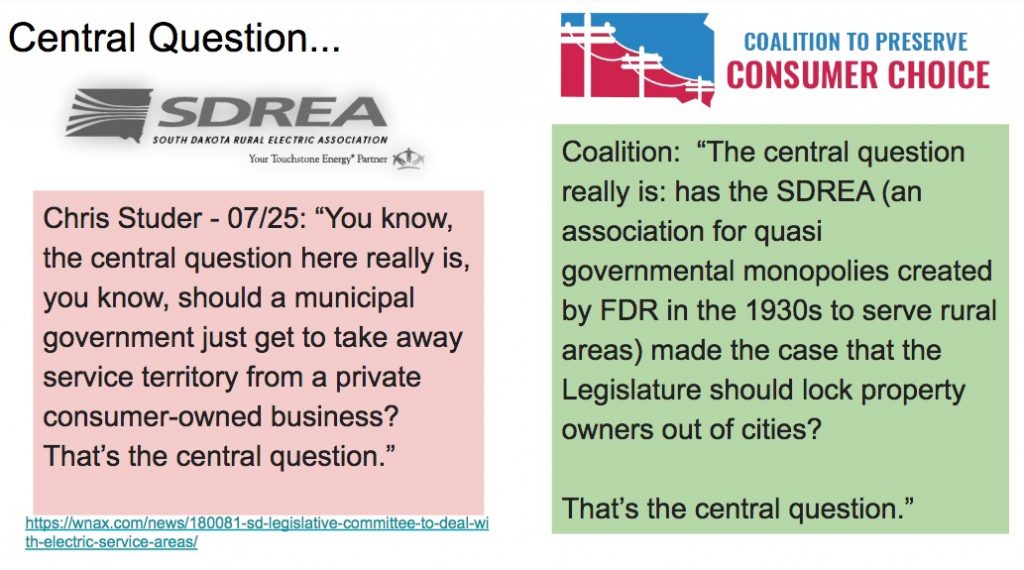
Clearly the munis are the good guys: their logo is in red white and blue! They drain the rural co-ops of color just as they wish to drain them of their prime customer territory. They then try to paint the rural co-ops as misrepresenting the “central question,” when the co-ops’ explanation is more concise and more accurate. The REA’s explanation of who is tussling here—municipal governments versus “private consumer-owned business[es]” aptly distinguishes the directly competing parties. The munis use language that serves more to spin than describe and distinguish: municipalities are monopoly electric providers just like rural co-ops. And it’s not private property owners lining up to raise hell in the lobby against the co-ops; it’s the munis.
The munis continue to emphasize the rural co-ops’ origins as “quasi-governmental” and “government-created” in other slides while underplaying their own identity as actual government. These local governments’ anti-government spin reaches a pinnacle of absurdity when they claim that annexation is the “Act of bringing new territory into City” and not “the government taking of private property:
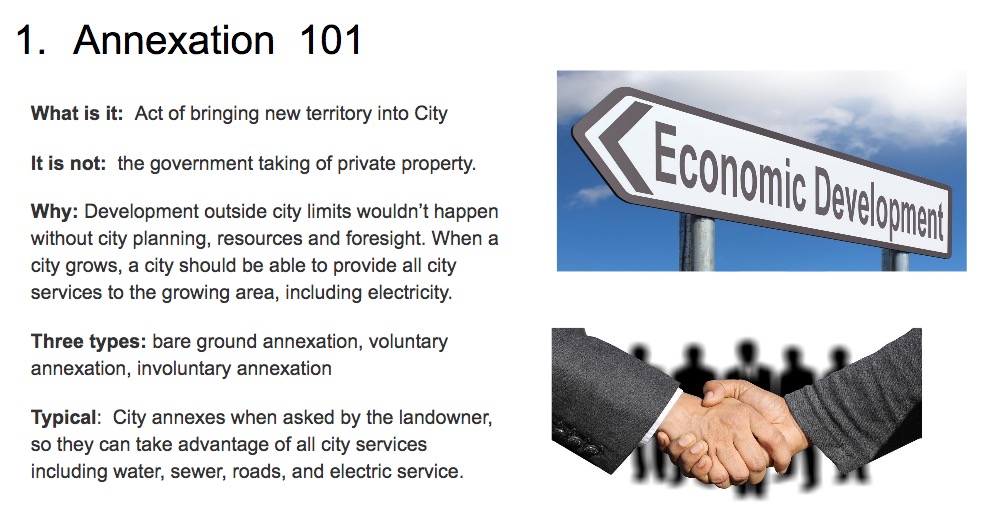
The munis here misdirect from the main issue: the controversy that required the convening of this interim committee rests squarely on the fact that annexing munis can indeed take private property (namely, electrical infrastructure) away from rural co-ops.
The munis go explicitly for the David-vs.-Goliath imagery by pointing out that the rural co-ops sell three times as much power to three times as many customers in South Dakota… but I don’t see in their slides where the munis explain how their relative size weighs in any way on the question of whether munis should get to unilaterally seize co-ops’ territory and infrastructure.
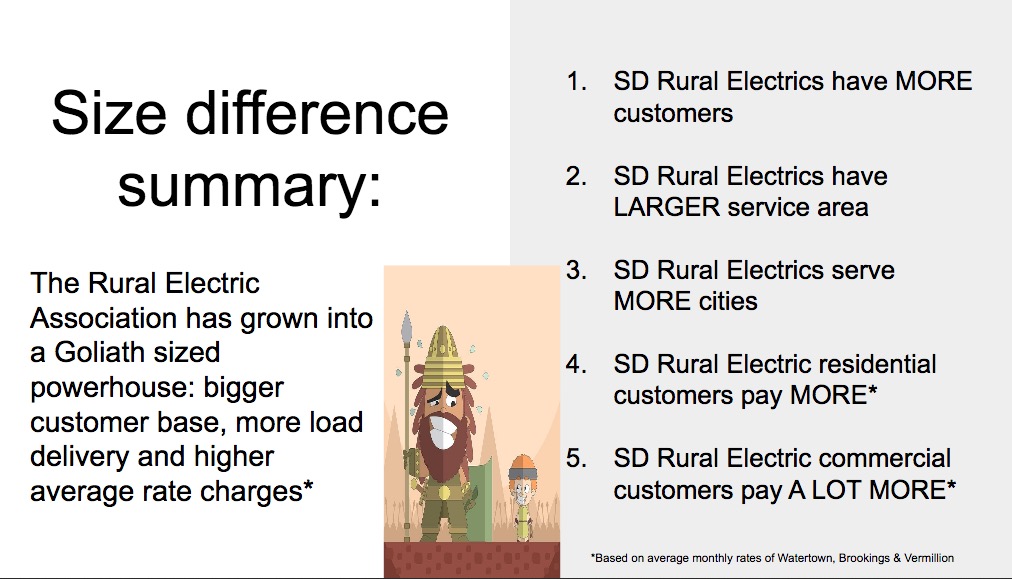
The only size question that strikes me as relevant is the size of consumers’ electric bills, and here, the munis have the co-ops by the tail:
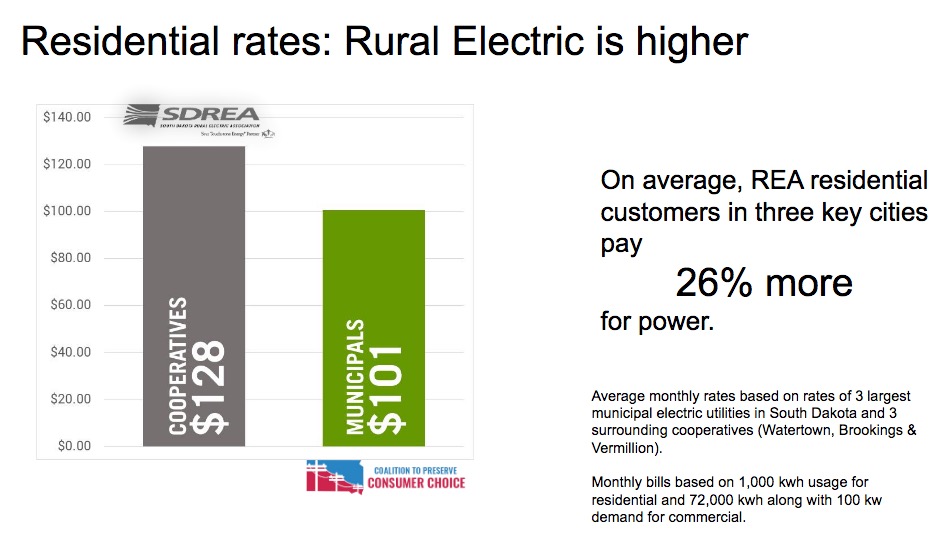
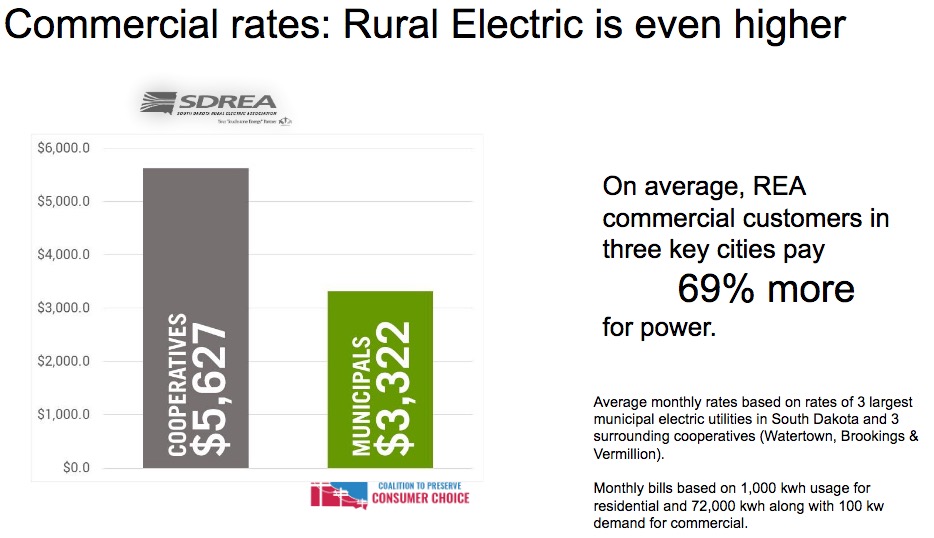
If these average rate differentials around Watertown, Brookings, and Vermillion are comparable for other municipal electric systems versus their neighboring rural co-ops, then sure, what homeowner or businessperson wouldn’t want to be annexed and enjoy cheaper electricity? Of course, that also assumes that the city electric discount isn’t offset by having to hook into all the other city services, pay city sales tax, pay city property tax, put up with the mayor’s baloney….
The cities also argue that city power is “more reliable… more resistant to outages,” and that when outages do occur, they are shorter and less frequent than in the country. The munis point to Brookings versus Sioux Energy to show muni power is ten times more reliable:
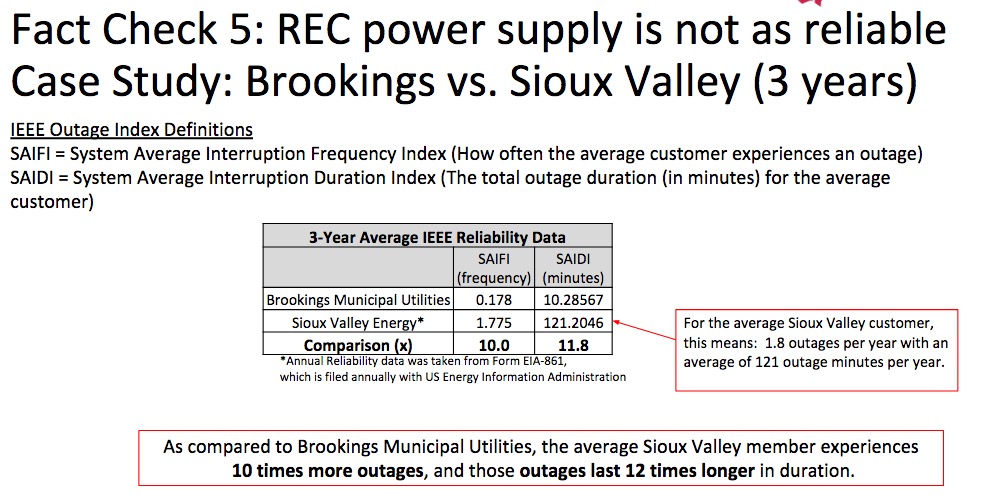
Broader data show that co-op outages are twice as frequent as a bit more than twice as long as muni outages:
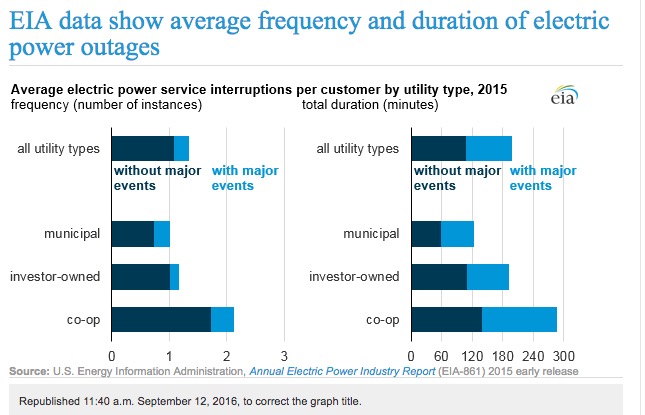
The EIA explains that rural co-ops have more and longer outages because they are serving tougher territory:
Factors such as weather, population density, and tree density also affect utilities’ ability to maintain service. For example, co-ops are generally suppliers to rural homes with more powerline miles and trees per customer, increasing the likelihood that distribution lines will be affected by storms. Municipalities are more likely to serve customers living in higher-density urban areas, which have fewer powerline miles per customer and, in some locations, underground distribution lines [USEIA, 2016.09.12].
Of course, we could flip the numbers and look at power reliability by how often the juice is on: munis keep the power on 99.977% of the time, while rural co-op customers get juice 99.946% of the time. Rural co-ops string power lines over hill and dale and slough out to darn near every back-forty shack in the state, and they miss the munis’ on time by just 0.031 percentage points.
That lack of density also explains the higher rates, as pointed out in the co-ops’ presentation to the Electric War Committee:
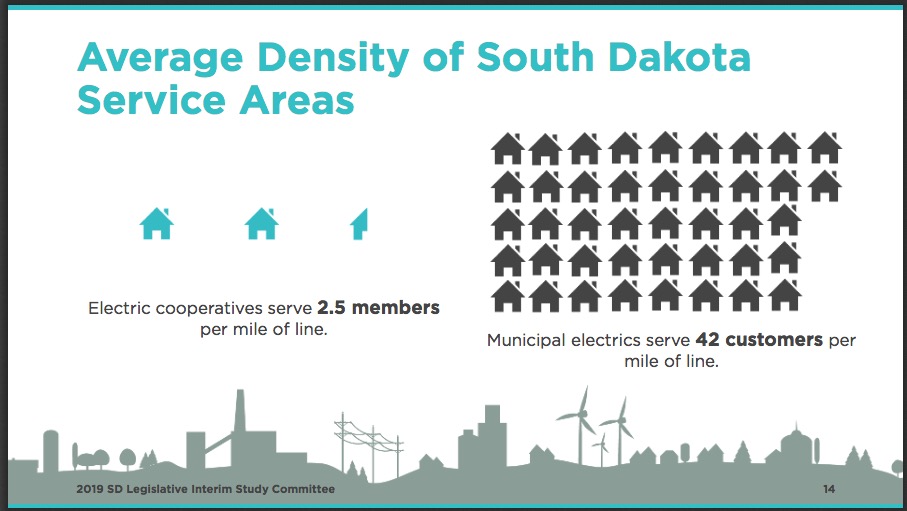
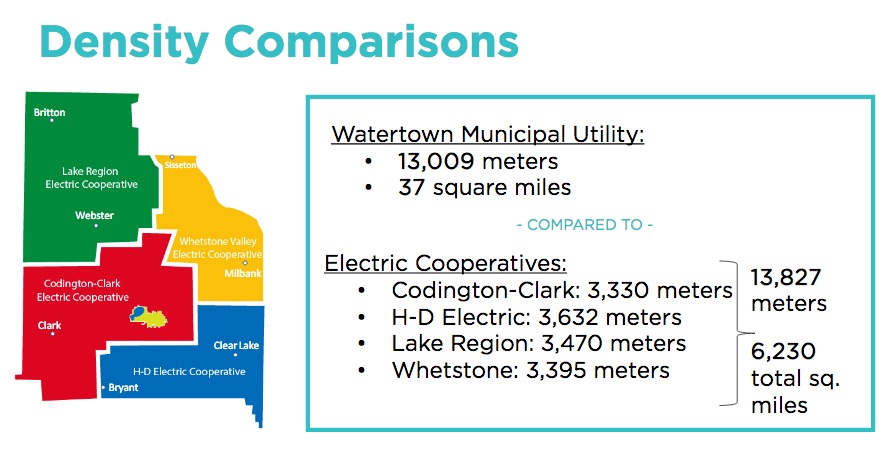
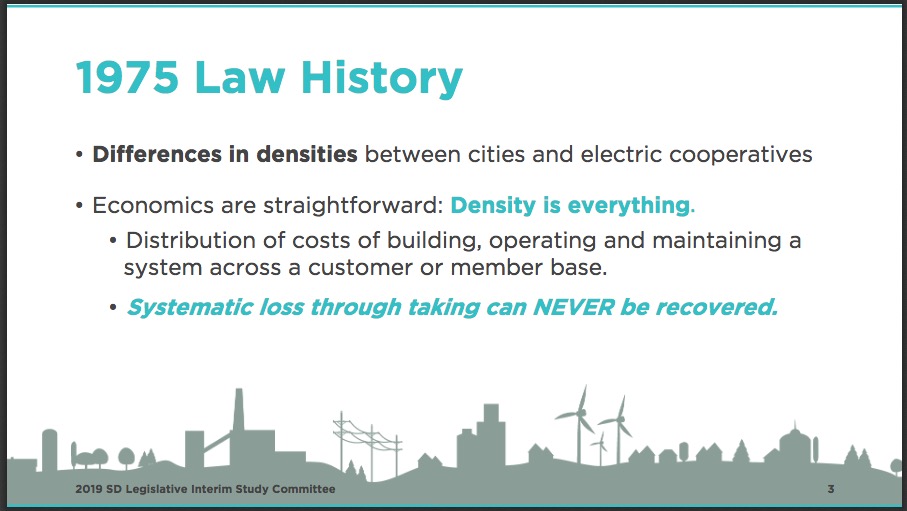
The co-ops serve only 6% as many customers per miles of line, yet they manage to keep their cost premium to residents at 26% over muni costs.
The big argument the munis make is that annexation and taking of rural co-ops territory and infrastructure is essential to economic development. Freeze electric service territories, and we stop “some cities from growing.”
I particularly enjoy the co-ops’ rebuttal of this claim, delivered by Linda Salmonson of East River Electric. The co-ops say, “Electricity is not generally the primary driver of economic development site selection or decision making” [slide 64]. The co-ops list the Governor’s Office of Economic Development’s top 26 projects of the last three years and says that only six took place in areas served by municipal electric systems:

The co-ops also post GOED’s own propaganda, seven top reasons for moving a business to this state, and none of them are, “Cheaper electricity”:

The co-ops make the point that they are partners in an economic development system in which municipal and rural dwellers depend on each other. Recruiting new businesses depends on having communities where people want to live… and if I may suggest a connection to today’s earlier writing, Brookings appears to get a lot of workers from surrounding communities that are made nicer places to live by their rural electric co-operatives. The co-ops also note that it’s hard for them to keep up their end of economic development when they plan their own investment on 30-year timeframes and greater, only to see municipalities surprise them by cherry-picking the cheapest-to-serve territories. The co-ops say they lose far more revenue than they receive from the compensation munis are required to give for their takings:
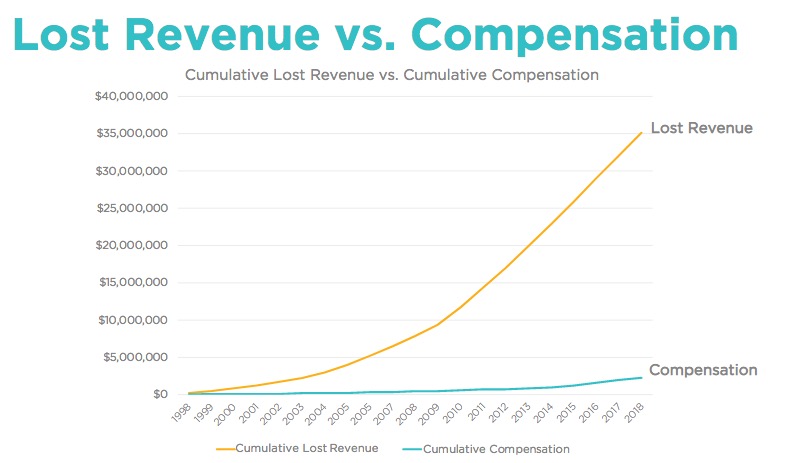
…and the co-ops close with the more accurate summation of the philosophical positions the policy combatants take in this dispute: “Unilateral taking of service territory by government holds the interests of government superior to any other participant in that industry” [slide 85].
I find the co-ops’ slides to be less propagandistic than the munis’. However, that doesn’t mean I’m picking my side in the electric war just yet. The munis have one particularly interesting slide toward the end of their show that strikes a chord with my policy debate soul, in which they take the classically conservative position that the burden of proof rests on those who advocate a change in the status quo and then lay out all the hurdles the co-ops must clear to meet that burden:
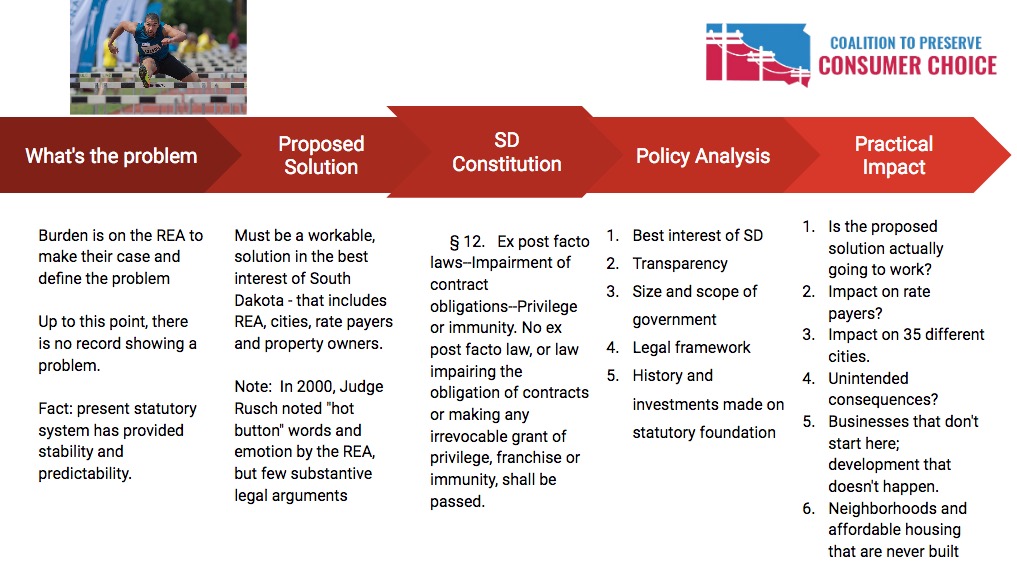
The munis are building part of their argument on speculative stilts—we can never prove “Businesses that don’t start here; development that doesn’t happen,” and “Neighborhoods and affordable housing that are never built.” But I am willing to accept the framing of the argument as a case that the co-ops must make and win for change.
Stay tuned: the Electric War Committee will meet several more times to figure out what if any legislation should be proposed in response to this battle.
The fact is the REA was a subsidized program from the beginning. Every city and town had electricity before lines were strung out in rural America. The cost of stringing lines to every farm just wasn’t going to pay. We now have lost lots of those subsidies along with the huge number of farm customers that have been put out of business.
Sooo, where does that put REA? I know my rates have gone up drastically and it looks like the more good paying customers they lose to these municipalities the more they are bound to go up. Too bad we have a modern electric farm. We should have never let that windmill water pumper fall apart!
Cory has correctly summarized the situation. The real Goliaths are the municipalities who year after year try to chip away at Rural Electric COOPS service territories. This is a serious issue for all rural electric coop members with serious long term impacts if the municipal electrics get their way. This battle has been going on the legislature for years. I only wish I would have somehow written down or recorded conversations with the lobbyists for the municipal league and the municipal electric lobbyists as they tried to get legislators to change the law. Great job Cory!
So, these municipal electric utilities… that’s pretty much just an East River thing, right?